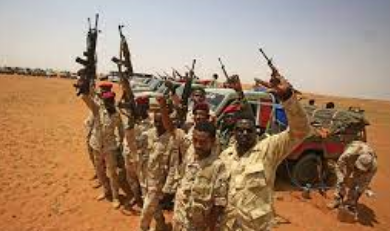After nearly five months under the control of the Rapid Support Forces (RSF), Zalingei, the capital of Central Darfur State, continues to grapple with significant security challenges, hindering the region’s journey towards peace and stability.
Complaints persist from both citizens and displaced persons regarding ongoing violations, particularly in the farms and areas surrounding Zalingei, as well as its peripheral markets. Instances of daily looting of homes in some neighborhoods and theft targeting commercial stores continue unabated. These issues have severely restricted commercial movements, forcing merchants to only partially reopen the city’s main market thus far.
An assessment of the security situation by an activist reveals unfavorable conditions, especially with agricultural activities suspended on the city’s outskirts. Citizens endure the consequences of lawlessness and rampant criminal activities. The proliferation of weapons among the populace exacerbates the security breakdown, leading to dire consequences for the region.
Despite a slight improvement in security following the ejection of the Sudan Armed Forces (SAF) by the RSF and the cessation of combat operations, the situation is regressing on the security front, as per the activist who opted to remain anonymous.
“Moreover, farmers express reluctance to plant crops during the current season due to mounting fears of attacks by pastoralists, posing a looming threat of humanitarian disaster and potential famine,” he said.
An IDP told Radio Tamazuj that the security situation remains extremely challenging. Despite their desire to return to the displacement camp, repeated attacks by lawless individuals on the displaced population impede their efforts. He emphasized the absence of any semblance of security amidst the ongoing looting and assaults on the displaced, even within markets and fields.
A local political figure, Ahmed Abbas, observed that the security situation remains stagnant. Persistent obstacles continue to hamper citizens at every level, affecting production, food security, grazing lands, and all available resources.
He cast doubt on the existence of a coherent security framework, suggesting that any attempts made are swiftly undermined by armed groups and criminals who sporadically perpetrate crimes in the city and its surroundings.
However, Zainab Abdullah expressed a degree of satisfaction with the security situation, noting relative stability in Zalingei following the RSF’s takeover. She remarked that citizens felt reassured after the cessation of hostilities, with the silence of artillery and indiscriminate shelling, which had previously accompanied extensive looting and vandalism by outlaws targeting numerous public and private facilities.
Abdullah emphasized that security is a relative concept and cannot be fully achieved.
“It is an ongoing and gradual process marked by occasional setbacks and improvements,” she stated. “Security breaches even occur in stable countries.”
She linked the improved security situation to the return of displaced persons to their camps, which they had abandoned during the height of the conflict last October, indicating a qualitative improvement in the security landscape.




